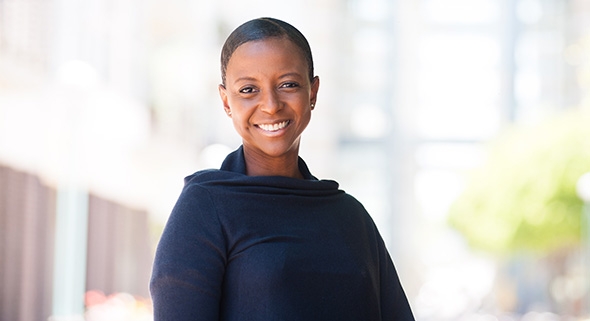Read the full story by Eric Smillie ’02, published in the September/October issue of Dartmouth Alumni Magazine.
When Alexandra Bernadotte ’92 got into Dartmouth there was much to celebrate. She was the first in her family to go to college, and it was an accomplishment that crowned much effort, from her parents’ emigration to Boston from Port-Au-Prince, Haiti, to a stellar high school career aided by the support of her extended family.

Determined to help improve the prospects of students like her, Alexandra Bernadotte ’92 founded the nonprofit Beyond 12 three years ago in San Francisco. (Photo courtesy of Alexandra Bernadotte ’92)
“We were about 10 cars deep,” she says, recalling the caravan. “My mom, my dad, my younger sister, my grandmother, my aunts and uncles, cousins, friends.” Once she was settled in Gile Hall and it was time for her coterie to go, Bernadotte says, “it was almost as if they clapped me on the back and washed their hands and were like, ‘OK, we’re done. You’ve made it, and you’re here.’ I think we all assumed that getting in was the most important step and that the most difficult part of the journey was behind us.”
It wasn’t. She bombed as a first-year student and spent a year on academic suspension. After difficult conversations with her family and some soul searching, she returned, doubled up on courses to fulfill a sociology major, and managed to graduate with her class.
The difficulties Bernadotte faced are mirrored in the experiences of others across the country. First-generation college students are twice as likely to drop out before their second year as those with at least one college-educated parent. And graduation rates for low-income students are weak: Only 10 percent of 24-year-olds in the lowest income quartile (the median age in most such computations) have a bachelor’s degree; in the top quartile, 71 percent do.
“The curricula standards to graduate from high school and those required of students upon college entry are completely different,” says Bernadotte. “We’re graduating lots of students who are college eligible but not college ready.”
Determined to help improve the prospects of students like her, Bernadotte founded the nonprofit Beyond 12 three years ago in San Francisco. Using a first-of-its-kind tracking program, her organization provides tools, information and coaches to fill in the missing pieces for disadvantaged students. If all goes according to plan, Beyond 12 will soon be aiding them by the hundreds of thousands.

